Five MENA Belt And Road Projects Foreign Investors Should Be Aware Of
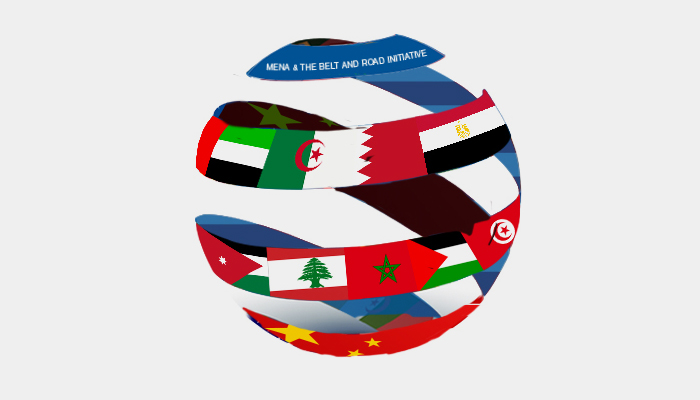
Op/Ed by Chris Devonshire-Ellis
- Middle-East & North Africa’s Five Primary BRI Projects
- Region has 60% Oil and 45% Global Reserves
- US$10 billion Construction Projects Proceeding
The MENA region – the Middle-East and North Africa – has also been targeted as part of Beijing’s Belt & Road Initiative, with greater interconnectivity and supply chains to much needed oil and gas reserves being put in place. The MENA region has vast reserves of petroleum and natural gas that make it a vital source of global economic stability, although this demand has also made the region the least peaceful in the world, with the class, cultural, ethnic, governmental, linguistic, and religious make-up of MENA highly variable. According to the Oil and Gas Journal, the MENA region has 60% of the world’s oil reserves and 45% of the world’s natural gas reserves.
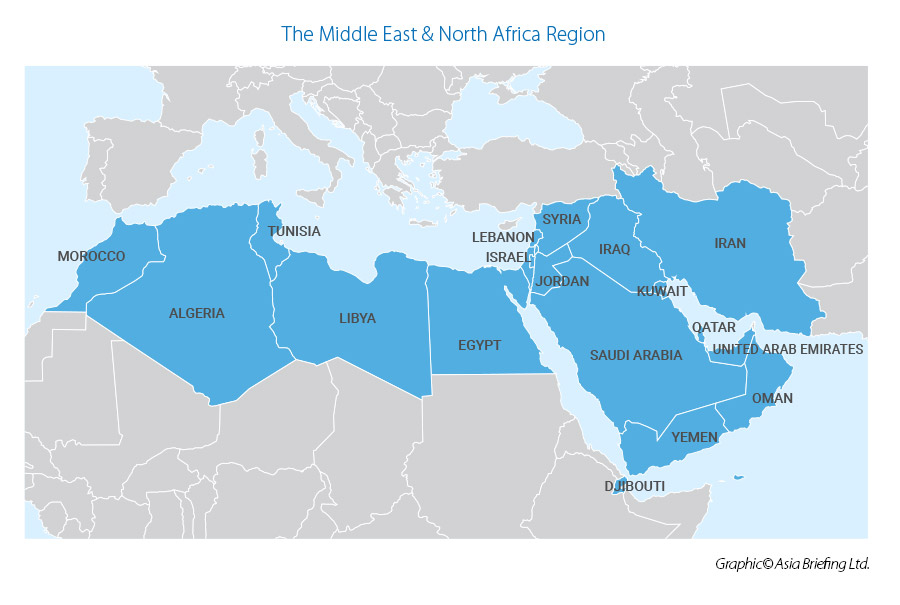
MENA also promises potential future markets – the region includes 578 million people. Here we highlight five primary MENA Belt and Road projects with values in excess of US$10 billion.
The four major projects are located in Egypt, Turkey, Jordan and UAE. The smaller one (US$62 million) is based in Lebanon; however China is keen to be involved in future infrastructure projects updating rail, road and logistics links between Lebanon and Syria as part of the BRI.
Relative to financing, the 4 largest projects all involved major Chinese partners, mostly within SPVs with local players. Debt was mostly provided by Chinese commercial banks and HSBC. The small cultural Silk Road project is being funded by Chinese grants. All 5 projects encountered COVID related delays earlier during 2020, but as seen below, construction had recommenced on all 5 MENA projects by December.
Egypt – Cairo’s New Administrative Capital & CBD

In January 2016, CSCE (which has been in Egypt for 36 years) signed a contract with the Egyptian Government to build a major CDB development in the new Administrative capital, located 50kms east of Cairo. With a total area of 505,000 m², the project consists of 20 buildings, including 12 high-rise office buildings, five high-rise apartment buildings, two luxury hotels, and a 385.8-meter-tall iconic tower, which will be the tallest in Africa.
In May 2018, CSCE began construction involving a team of circa 7,000 Chinese and Egyptian workers. Since the virus outbreak in Egypt in February 2020, CSCEC adopted strict anti-virus measures to ensure the safety in the construction area, where staff and workers were required to wear face masks and gloves, ride in designated vehicles, and receive regular temperature tests. In March 2020, CSCE capped building CO3, the first of its 20 towers in the complex. In September, Civil Engineer Mohamed Nagar introduced the “building machine” used for the iconic tower. This self-developed technology can finish building one floor in five days when operating at its full capacity. The 80 floor tower, which had been built to its 40th floor, is expected to be completed during H2 2021. In November 2020, CSCE agreed a US$2.2bn loan to finance its costs on the US$3.0 billion Phase 1 of the CDB project. HSBC Egypt led a 13.5-year facility covered by Sinosure. The whole project, with a construction area of about 1.9 million m², is scheduled to be delivered by 2022.
Turkey – The Hunutlu Thermal Power Plant
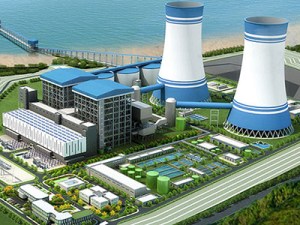
In September 2019, construction commenced on the Hunutlu Thermal Plant, a US$1.7bn coal plant on the southern coast of Turkey, in the coastal town of Yumurtalik near the Syrian border. This represents China’s largest ever direct investment in Turkey and links the BRI with Turkey’s ‘Middle Corridor’ vision. The project’s sponsor is Emba Electricity Production, a SPV/JV owned by Shanghai Electric Power (78%), Avic International and two Turkish investors. The project also includes a port to receive the coal.
This imported coal fired thermal power plant will have a capacity of 2 x 660 MW (1.3MW) and will produce 11.5 billion kw/h electricity. It is expected to contribute an estimated 3% of all electricity supplied across Turkey. The plans included employment opportunities for 4,000 employees during construction and 500 employees during production phase. The project was approved in 2015 but has been subject to numerous delays including domestic environmental objections/lawsuits. In 2020, Turkey was the worst-hit country by COVID-19 in MENA, with over 1.8 million infections. However, altogether 1,831 Chinese and Turkish personnel chose to stay and continue their work. In August, to speed up the construction, 455 Chinese staff members flew to Turkey and joined the project, despite the health risks. The project remains on course to be completed by the end of this year.
Jordan – Attarat Oil Shale Power Plant
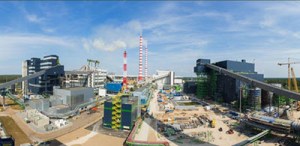
The Attarat Power Plant is an oil shale-fueled power plant under construction in the Attarat Um Ghudran area, 50 kms (31 mi) east of Al Qatranah in Jordan. The project is developed by the Attarat Power Company (APCO), a partnership between YTL Power International (45%), Guangdong Yudean Group (45%) and Eesti Energia (10%). It is the first oil shale power plant in Jordan and the largest private sector project in Jordan to date. Once completed, the largest oil shale-fired power plant in the world after Narva Power Plants in Estonia and will meet around 15% of Jordan’s power needs.
The US$2.1 billion project is financed by US$528 million investment from its shareholders and US$1.6 billion debt provided by Bank of China, ICBC and Sinosure (its largest to date). In May 2020, after two months of suspension caused by COVID-19, construction was gradually resumed led by China Energy Engineering Group Guangdong Power Engineering, constructor of the project. 2,000 Chinese workers worked through the pandemic, even as the situation in Jordan worsened, but continued their work with high-level preventive measures, to deliver on schedule. One generator under construction is about to be delivered, and the second by the end of this year.
UAE – Hassyan Clean Coal Power Plant
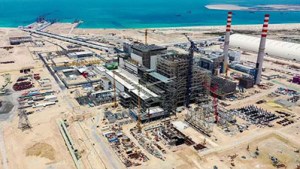
The 2.4 MW Hassyan clean coal power plant is the first clean coal power plant in the Gulf Cooperation Council (GCC) region. The plant comprises four 600MW ultra-supercritical units, which can run on coal, or natural gas as a backup. The plant is scheduled to be fully operational in 2023 and when operational will provide 20% of Dubai’s power needs as well as significantly reduce locals’ electricity costs. This project is an anchor of the Emirate of Dubai’s Integrated Energy Strategy 2030 for ensuring security of energy supply at a cost competitive basis reducing dependence on entirely imported natural gas by diversifying the fuel mix in power generation. The project is led by Dubai Electricity & Water Authority (DEWA). It utilizes an Independent Power Producer procurement model on a Build Own Operate basis and is supported by a 25-year Power Purchase Agreement (PPA) with DEWA.
In 2016, DEWA signed the PPA, Shareholders Agreement, and other project agreements with the consortium led by ACWA Power. Total investment of the project is $3.4 billion; ownership of Hassyan Energy (SPV); DEWA 51%, ACWA Power 27%, Harbin Electric 14.7% and the Silk Road Fund (7.35%), reflecting the importance of the project within the framework of the BRI and the UAE Energy Strategy 2050. ACWA Power and Harbin Electric began construction in late 2016 which plans to be fully operational in 2023. In July, the No 1 generator unit of the Dubai Hassyan began full-load trial operations. With the goal of starting partial operations in 2020, the 1st unit will provide power supply guarantees for Expo 2020 Dubai, which has been rescheduled until late 2021. Safeguarded by high-standard health and hygiene measures, the company has realized important achievements, including connection to the grid for power generation. At the beginning of December, last year, the project’s commercial operations began.
Lebanon – National Music Conservatory
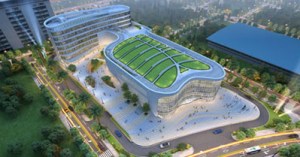
In January 2018, upon the request of the Lebanese government, the Chinese government offered assistance to Lebanon to build this conservatory. It is the first comprehensive project the Chinese government will launch in Lebanon. In May 2019, The China-Aid Lebanese National Higher Conservatory of Music is well under way with the start of construction planned for late 2019-early 2020 in Dbayeh, near Beirut.
The project is expected to be completed in two years. In December 2019, Lebanon and China agreed a new music conservatory, with an investment of US$62 million. The new conservatory will be constructed by CSCE and completed within three years.
The project is considered an important landmark in the cultural exchanges between China and Lebanon under the framework of the BRI. The conservatory, covering an area of 39,000 m², will feature teaching rooms, a library, lecture and auditorium halls, as well as a theatre which can host up to 1,200 people. Bassam Saba, head of the Lebanese National Higher Conservatory of Music, said this new project will give an opportunity to students who want to pursue higher levels of music studies. Lebanese Culture Minister Abbas Mortada said the conservatory will serve as a meeting point for artists in Lebanon and neighbouring countries in the region. Six months later, in May 2020, China and Lebanon signed agreements to establish cultural centres in the two countries’ capitals on the basis of equality and mutual benefit, according to the agreement. In December 2020, the ground-breaking ceremony for the conservatory was held.
The on-going work on these projects are an apt illustration that although the Covid-19 invariably slowed progress on some of the planned Belt & Road Initiative projects, work in some cases continued throughout the pandemic and many are now back on track.
We are grateful to Henry Tillman and his team at China Investment Research for their assistance with this article.
Related Reading
About Us
Silk Road Briefing is written by Dezan Shira & Associates. The firm has 28 offices throughout Asia, and assists foreign investors into the region. For strategic advisory and business intelligence issues please contact the firm at silkroad@dezshira.com or visit www.dezshira.com





